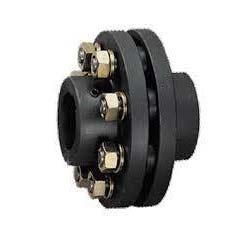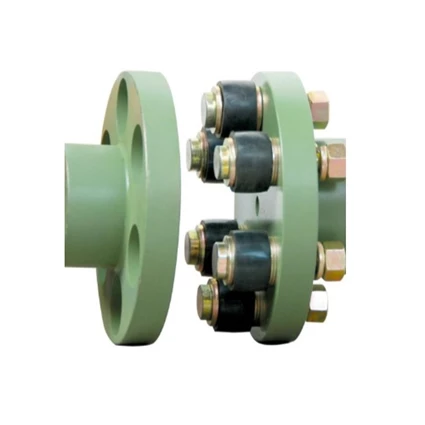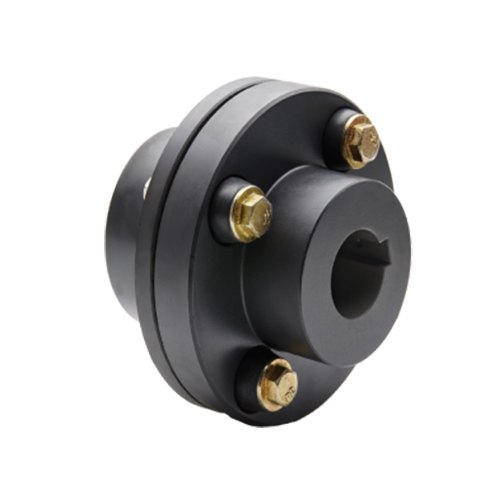Product Description
Universal coupling
Enables the mechanical jointing of pipes made of different materials and of various outside diameters
Description
Wide outside diameter range: an average of 29 mm.
High performance
– Permanent leak tight joint when compressing the gasket between the end ring and the sleeve CHINAMFG the pipe surface
– Epoxy powder coating (250 μm) and Geomet 500 Gr. B for the bolts.
Ease and speed of installation:
– Angular deflection ± 5° by side.
– Absorbs expansion and contraction.
– Accommodates misalignment.
– Important setting gap.
Conformity to standards
– EN 14525 : Ductile iron wide tolerance couplings and flange adaptors for use with pipes of different materials: ductile iron, Grey iron, Steel, PVC-U, PE, Fiber-cement.
– NF A 48-830: Foundry products – Spheroidal graphite cast iron fittings for PVC drinking water pipes under pressure,
– EN 545: Ductile iron pipes, fittings, accessories and their joints for water pipelines
– requirements and test methods,
– ISO 2531: Ductile iron pipes, fittings, and accessories and their joints for water applications.
Approval:- Drinking water approved (WRAS).
Note:
– This coupling does not resist to longitudinal forces and pipe pullout will occur. Ensure adequate restraint is provided.
– Not recommended for PE pipes.
Technical data
Range: DN 40 to 600.(Higher DN, please consult uUniversal coupling
Enables the mechanical jointing of pipes made of different materials and of various outside diameters
Description
Wide outside diameter range: an average of 29 mm.
High performance
– Permanent leak tight joint when compressing the gasket between the end ring and the sleeve CHINAMFG the pipe surface
– Epoxy powder coating (250 μm) and Geomet 500 Gr. B for the bolts.
Ease and speed of installation:
– Angular deflection ± 5° by side.
– Absorbs expansion and contraction.
– Accommodates misalignment.
– Important setting gap.
Conformity to standards
– EN 14525 : Ductile iron wide tolerance couplings and flange adaptors for use with pipes of different materials: ductile iron, Grey iron, Steel, PVC-U, PE, Fiber-cement.
– NF A 48-830: Foundry products – Spheroidal graphite cast iron fittings for PVC drinking water pipes under pressure,
– EN 545: Ductile iron pipes, fittings, accessories and their joints for water pipelines
– requirements and test methods,
– ISO 2531: Ductile iron pipes, fittings, and accessories and their joints for water applications.
Approval:- Drinking water approved (WRAS).
Note:
– This coupling does not resist to longitudinal forces and pipe pullout will occur. Ensure adequate restraint is provided.
– Not recommended for PE pipes.
Technical data
Range: DN 40 to 600.(Higher DN, please consult us)
Max. working pressure: PN 16
Temperatures: from
2. How soon can I get a price quote?
Once we know the Size, material, drive method we can provide you with 1 competitive price quote within 24 hours.
3. Can I get a sample?
Yes, the samples are free for you. But you need to offer 1 courier account NO. to afford the fee for samples shipping. The samples’ sending usually takes 5-7days.
4. How can my order produced by my brand?
Yes, you can. Pls offer your brand or LOGO design to us(.AI or.PSD format), then we could produce all goods with your brand or LOGO.
5. What’s your delivery time?
Except our legal holiday, it will take 2-4 weeks for us to finish all your orders’ production.
6. Is there a minimum order requirement?
Due to the high machine setup cost and shipping freight, our minimum order quantity is 5pcs
7. Do you have butterfly valve related accessories?
Yes, we have. We have accessories: pneumatic actuators, electric actuators, limit switches, solenoid valves, etc.
8. Will you match competitors’ prices?
If you find a lower price elsewhere for the exact same specification, we will meet or beat that price as long as it is a little higher than our cost price.
9. What are your terms of delivery?
We accept FOB, CIF etc. You can choose the 1 which is the most convenient or cost effective for you.
10. Where can I meet you by face to face?
A,Our headquarter is located in ZheJiang , if you travel to ZheJiang , you can visit our office at any time, we could pick you up from your location in ZheJiang and ZheJiang .
B,Our factories are located in ZheJiang and HangZhou, welcome to visit our factory before you cooperate with us.
C,We will attend China Spring Canton Fair and China Autumn Canton Fair every year, welcome to visit our booth at that time.
11. How can I be your sole agent in our country?
Welcome you to become our sole agent firstly. According to different countries’ demand, if your yearly purchase quantity from us can reach 10000 to 30000 pcs you could be our sole agent in your country. If you wanna know exact quantity requirement for each country, pls feel free to contact us at any time.
/* March 10, 2571 17:59:20 */!function(){function s(e,r){var a,o={};try{e&&e.split(“,”).forEach(function(e,t){e&&(a=e.match(/(.*?):(.*)$/))&&1

Can Flange Couplings Be Used in Applications with Varying Operating Temperatures?
Yes, flange couplings can be used in applications with varying operating temperatures. However, the selection of the appropriate flange coupling material is essential to ensure reliable performance and longevity under these conditions.
The operating temperature of a flange coupling depends on several factors, including the type of material used, the surrounding environment, and the specific application. Here are some key considerations:
- Temperature Rating of Material: Flange couplings are available in various materials, such as steel, stainless steel, aluminum, and different alloys. Each material has its temperature rating, which indicates the maximum temperature the coupling can handle without compromising its mechanical properties. It is crucial to select a flange coupling made from a material that can withstand the highest expected operating temperature in the application.
- Thermal Expansion: Temperature variations can cause thermal expansion and contraction of the connected equipment and shafts. Flange couplings must be able to accommodate these changes in length without imposing excessive forces on the machinery. Flexible couplings with certain designs, such as those with elastomeric elements, can better handle thermal expansion and help minimize stress on the system.
- Lubrication: Operating at high temperatures may require the use of specialized high-temperature lubricants to ensure smooth operation and reduce friction and wear between the coupling’s moving parts. Proper lubrication is essential to prevent premature failure and to maintain the coupling’s performance over time.
- Environmental Factors: The surrounding environment can also influence the operating temperature of the flange coupling. For example, couplings used in industrial settings may be exposed to hot processes or elevated ambient temperatures. In such cases, the coupling’s material and design should be selected to withstand the specific environmental conditions.
It is crucial to consult the manufacturer’s guidelines and technical specifications to determine the suitable temperature range for a particular flange coupling model. Additionally, considering the application’s operating conditions, including temperature variations, helps in choosing the right flange coupling to ensure reliable and safe performance in a wide range of temperature environments.

Key Features to Consider When Purchasing a Flange Coupling
When purchasing a flange coupling, it is essential to consider several key features to ensure it meets the specific requirements of your application. Here are the main factors to look for:
- Type of Flange Coupling: There are various types of flange couplings, such as rigid, flexible, and fluid couplings. Choose the type that best suits your application’s needs, considering factors like misalignment compensation, torsional stiffness, and vibration damping.
- Size and Dimensions: Select the flange coupling with the appropriate size and dimensions to fit your shafts and equipment. Consider shaft diameter, coupling length, and any space limitations.
- Material: Flange couplings can be made from various materials, including steel, aluminum, stainless steel, and elastomers. Choose a material that offers the required strength, corrosion resistance, and durability for your operating conditions.
- Torsional Rating: Check the torsional rating of the flange coupling to ensure it can handle the torque requirements of your application without failure or deformation.
- Misalignment Compensation: If your application experiences shaft misalignment, opt for a flexible flange coupling that can accommodate angular, parallel, and axial misalignment to prevent stress on connected equipment.
- Backlash: For precision applications, select a flange coupling with minimal or no backlash to maintain accurate positioning and reduce the effects of mechanical play.
- Operating Speed: Consider the operating speed range of the flange coupling to ensure it can handle the rotational speed requirements without issues like resonance or fatigue.
- Environmental Compatibility: Evaluate the flange coupling’s ability to withstand the environmental conditions of your application, such as temperature, humidity, and exposure to chemicals or corrosive substances.
- Installation and Maintenance: Choose a flange coupling that is easy to install and maintain, as proper installation and periodic maintenance are crucial for optimal performance and longevity.
- Cost and Value: Compare the cost of the flange coupling with its features and performance to ensure you are getting the best value for your investment.
By carefully considering these key features, you can select a flange coupling that not only meets the demands of your application but also ensures reliable and efficient power transmission while minimizing downtime and maintenance costs.

Limitations and Disadvantages of Flange Couplings
While flange couplings offer several advantages, they also have some limitations and disadvantages that should be considered when selecting them for a specific application:
- 1. Size and Weight: Flange couplings tend to be larger and heavier compared to some other coupling types. This can be a limitation in applications where space and weight are critical factors.
- 2. Higher Cost: Flange couplings can be more expensive to manufacture and install compared to simpler coupling designs like sleeve couplings or clamp couplings.
- 3. Complex Installation: Installing flange couplings may require more time and expertise due to their intricate design and multiple components, including bolts and gaskets.
- 4. Rigidity: Flange couplings are relatively rigid, which means they may not accommodate as much misalignment as flexible couplings. Excessive misalignment can lead to increased stress on the equipment and coupling, potentially resulting in premature failure.
- 5. Bolt Stress: Proper tightening of the bolts is crucial for the effective functioning of flange couplings. Over-tightening or under-tightening the bolts can lead to bolt fatigue or coupling slippage.
- 6. Noise and Vibration Transmission: Flange couplings, especially rigid designs, can transmit more noise and vibration compared to flexible couplings, potentially affecting the performance and longevity of connected equipment.
- 7. Maintenance: Flange couplings may require more frequent maintenance due to the presence of multiple components and the need to periodically check bolt tightness and gasket conditions.
- 8. Corrosion: Depending on the material used, flange couplings may be susceptible to corrosion in certain environments. Corrosion can compromise the integrity of the coupling and reduce its service life.
Despite these limitations, flange couplings are still widely used in various industrial applications due to their robustness, high torque capacity, and ability to handle heavy loads. Proper application, installation, and maintenance can help mitigate some of these disadvantages and ensure the reliable performance of flange couplings in a wide range of systems.


editor by CX 2024-02-08